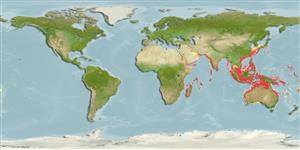Environment: milieu / climate zone / depth range / distribution range
Ecología
marino batidemersal; no migratorio; rango de profundidad 1 - 150 m (Ref. 128812). Deep-water
Distribución
Países | Áreas FAO | Ecosistemas | Ocurrencias, apariciones | Point map | Introducciones | Faunafri
Indo-West Pacific: Tanzania up to the Red Sea and New Caledonia; north to Japan, south to Australia.
Length at first maturity / Tamaño / Peso / Age
Maturity: Lm 15.0 range ? - ? cm
Max length : 28.0 cm OT macho / no sexado; (Ref. 45091)
Short description
Claves de identificación | Morfología | Morfometría
Espinas dorsales (total) : 0; Radios blandos dorsales (total) : 17 - 19.
Deep water species, associated with corals (Ref. 52034). Ovoviviparous (Ref. 205). The male carries the eggs in a brood pouch which is found under the tail (Ref. 205).
Life cycle and mating behavior
Maturities | Reproducción | Spawnings | Egg(s) | Fecundities | Larva
Male carries the eggs in a brood pouch (Ref. 205).
Lourie, S.A., R.A. Pollom and S.J. Foster, 2016. A global revision of the seahorses Hippocampus Rafinesque 1810 (Actinopterygii: Syngnathiformes): taxonomy and biogeography with recommendations for further research. Zootaxa 4146(1):1-66. (Ref. 115213)
IUCN Red List Status (Ref. 130435)
Threat to humans
Harmless
Human uses
Herramientas
Special reports
Download XML
Fuentes de Internet
Estimates based on models
Preferred temperature (Ref.
123201): 23.3 - 28.4, mean 27.3 °C (based on 787 cells).
Phylogenetic diversity index (Ref.
82804): PD
50 = 0.5000 [Uniqueness, from 0.5 = low to 2.0 = high].
Bayesian length-weight: a=0.00447 (0.00177 - 0.01127), b=3.00 (2.78 - 3.22), in cm total length, based on LWR estimates for this (Sub)family-body shape (Ref.
93245).
Nivel trófico (Ref.
69278): 3.4 ±0.5 se; based on size and trophs of closest relatives
Resiliencia (Ref.
120179): Medio, población duplicada en un tiempo mínimo de 1.4-4.4 años (Assuming tmax>3).
Fishing Vulnerability (Ref.
59153): Low vulnerability (10 of 100).
